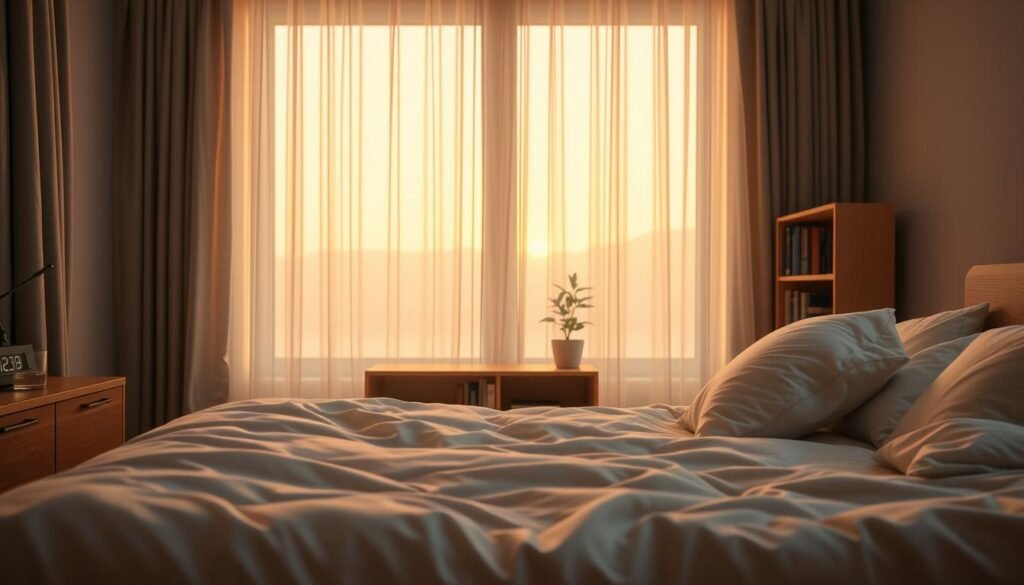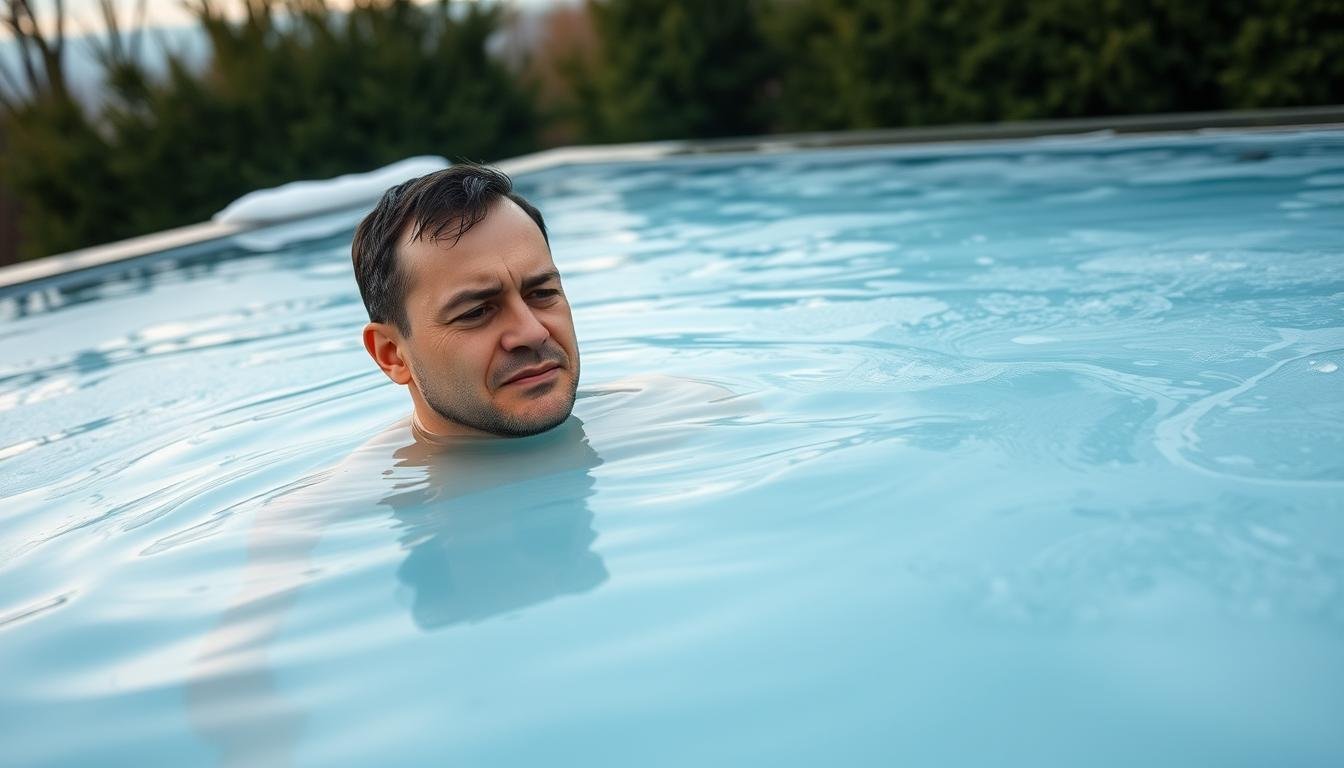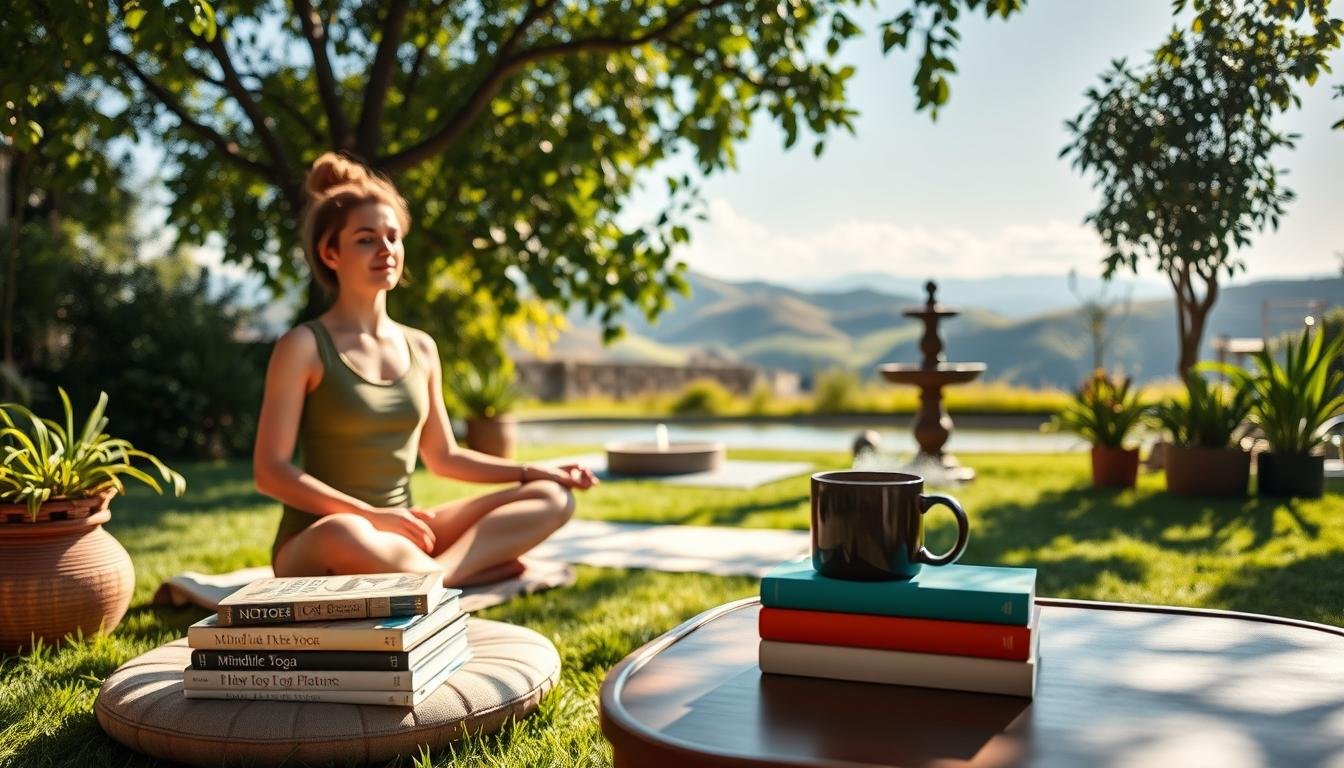Using digital devices before bed can harm your sleep quality. But why? The main culprit is blue light from these devices. It messes with your sleep patterns and can make you feel more anxious.
Modern life demands we understand blue light exposure well. Knowing where blue light comes from and how it affects us is key. This knowledge helps us find ways to lessen its bad effects.
By taking action, you can lower the risks of blue light exposure. This improves your sleep and mental health.
Key Takeaways
- Understand the sources and effects of blue light exposure.
- Learn how blue light affects sleep quality and anxiety.
- Discover practical strategies to minimize blue light exposure.
- Improve your sleep hygiene with simple changes.
- Reduce the risk of anxiety related to screen time.
Understanding Blue Light and Its Sources
In today’s world, you’re exposed to blue light more than ever. This affects your sleep and can raise your anxiety levels. Blue light, a high-energy visible (HEV) light, comes from devices like smartphones, computers, and TVs. Knowing where blue light comes from is key to good sleep and digital wellness.
What is Blue Light?
Blue light has a wavelength of 400-450 nanometers. This light messes with your body’s clock and melatonin production, which can mess up your sleep. Studies show that blue light in the evening makes it tough to fall asleep because it tricks your brain into thinking it’s still day.
Common Sources of Blue Light
The main sources of blue light are:
- Smartphones
- Computers and laptops
- Televisions
- Tablets and e-readers
These devices are everywhere in our lives, making blue light exposure common.
The Role of Technology in Blue Light Exposure
Technology is a big part of blue light exposure. More screen time means more blue light, whether at work or play. The American Academy of Sleep Medicine says using devices before bed can mess up sleep and cause sleep disorders.
“The use of electronic devices before bedtime can disrupt sleep patterns and lead to sleep disorders.”
The Connection Between Blue Light and Sleep Quality
Blue light from screens is a big deal in today’s world. It’s important to know how it affects your sleep.
Smartphones, tablets, and computers all give off blue light. This light suppresses melatonin production. Melatonin is the hormone that helps you sleep.
How Blue Light Affects Melatonin Production
Melatonin is key for a good night’s sleep. Blue light in the evening makes your brain think it’s still day. This makes it hard to fall asleep and can lower sleep quality.
To help your sleep, try these sleep hygiene tips:
- Limit screen time before bed
- Use blue light filtering glasses or apps
- Dim or turn off screens at least an hour before sleep
Sleep Cycle Disruption from Excessive Screen Time
Too much screen time messes with your sleep in many ways. Blue light affects melatonin, and digital content keeps your brain awake. This makes it tough to relax before bed.
The table below shows how blue light impacts sleep:
| Blue Light Exposure Effects | Impact on Sleep |
|---|---|
| Suppresses melatonin production | Leads to difficulty falling asleep |
| Disrupts natural sleep-wake cycle | Results in poor sleep quality |
| Increases brain activity | Makes it harder to relax before sleep |
Knowing the blue light exposure effects helps you sleep better. Cut down on screen time before bed. Use night mode or blue light filtering on your devices.
Screen Time Anxiety: Signs and Symptoms
In today’s world, feeling overwhelmed by digital demands is common. This can lead to screen time anxiety. It’s a feeling of stress and worry about using digital devices too much.
Knowing the signs of screen time anxiety is key to managing it. Constantly being connected can make you feel like you always need to be checking something. This can be emails, social media, or notifications.
Recognizing the Impact of Constant Connectivity
Constantly being connected can really affect your mental health. Too much screen time can make you feel more anxious and depressed. As one expert says,
“The constant stream of information can be overwhelming, leading to a sense of burnout and fatigue.”
You might notice symptoms like:
- Feeling anxious or uneasy when you can’t check your device
- Having trouble focusing because of all the notifications
- Having trouble sleeping because of screen time before bed
Coping Mechanisms for Screen Time Anxiety
But there are ways to deal with screen time anxiety. Using digital detox tips can help. Try setting times or days when you don’t use devices. You can also do things offline or practice mindfulness.
Some people find that melatonin supplements help with sleep. This can lessen anxiety from screen time. But, always talk to a doctor before taking any supplements.
By recognizing the signs of screen time anxiety and using coping strategies, you can lessen its impact. This can improve your overall well-being.
The Importance of a Digital Detox
Notifications and screens are everywhere. A digital detox offers a much-needed break. It’s key to understand the benefits of stepping away from our devices.
What is a Digital Detox?
A digital detox means not using digital devices for a while. It helps you recharge and cut down on blue light. This break can help you control your screen time and boost your well-being.
Benefits of Reducing Screen Time
Less screen time can improve your sleep, lower anxiety, and boost productivity. Adding digital detox tips to your day can show you these benefits.
Here are some main benefits of a digital detox:
- Improved sleep quality
- Less anxiety and depression
- More focus and productivity
- More creativity and inspiration
Let’s look at how digital detox affects daily life:
| Aspect | Before Digital Detox | After Digital Detox |
|---|---|---|
| Sleep Quality | Poor due to too much screen time | Better with less blue light |
| Anxiety Levels | High from constant notifications | Lower with less screen time |
| Productivity | Lower from digital distractions | Higher with more focus |
By using digital wellness strategies like regular detoxes, you can reduce screen time. This can greatly improve your life quality. Adding these habits to your day can make a big difference in your health.

When thinking about a digital detox, aim for a balance that suits you. Taking charge of your digital habits can lead to a healthier, more balanced life.
Tips for Implementing a Digital Detox
By following a few simple steps, you can improve your sleep quality and cut down on screen time risks. A digital detox is more than just cutting back on screens. It’s about building a healthier relationship with technology.
Establishing Screen Time Boundaries
It’s key to set limits on your screen time for a digital detox to work. You can choose specific times of the day to avoid screens or limit them to certain tasks. For example, you might not use screens during meals or an hour before bed.
These limits help you avoid blue light and protect your sleep. It’s a simple way to make a big difference.
Practicing Device-Free Zones
Make some areas in your home screen-free to cut down on screen time. This could be your bedroom or living room. It helps create spaces for relaxation and less temptation to check devices.
This approach not only helps with sleep hygiene but also encourages more face-to-face time. It’s a great way to engage in other activities.
Engaging in Offline Activities
Doing things offline is a big part of a digital detox. This includes reading, exercising, or hobbies that don’t involve screens. Finding new ways to relax and have fun without screens can greatly reduce your screen time.
Activities like journaling, meditation, or spending time outdoors are especially good. They help lower screen time anxiety and promote a healthier lifestyle.
By using these digital detox tips, you can see big improvements in your sleep and health. Being mindful of your screen use and making a few changes can lead to better sleep, less anxiety, and a more balanced life.
Strategies for Promoting Better Sleep
To get better sleep, it’s key to relax and avoid blue light. Good sleep habits can make you feel much better. They help you sleep more soundly.
Start a bedtime routine to tell your body it’s time to sleep. Choose activities that calm you down.
Creating a Relaxing Nighttime Routine
A calming pre-sleep routine is vital for better sleep. Try relaxation techniques like meditation, reading, or a warm bath.
Here are some activities for your bedtime routine:
- Meditation or deep breathing exercises
- Reading a book or listening to soothing music
- Taking a warm bath or shower
- Writing in a journal
Adding these to your routine can improve your sleep. It gets your body ready for a good night’s sleep.
Limiting Screen Use Before Bedtime
It’s also important to cut down on screen time before bed. The blue light from screens can stop your body from making melatonin. This hormone helps you sleep.
Here’s a table showing how screen time affects sleep:
| Screen Time Before Bed | Sleep Quality | Melatonin Production |
|---|---|---|
| High | Poor | Suppressed |
| Moderate | Average | Partially Suppressed |
| Low | Good | Normal |
As the table shows, less screen time before bed means better sleep. Use blue light filtering glasses or apps to help.

By following these tips, you can sleep better and feel great. Remember, cutting down on screen time and having a relaxing bedtime routine are key.
Melatonin Support for Improved Sleep
To get better sleep, knowing how melatonin helps is key. Melatonin is a hormone that helps us sleep and wake up. Blue light from screens can mess with this. Learning how to boost melatonin naturally or with supplements is important for those who can’t sleep well.
Natural Sources of Melatonin
You can get melatonin from food too. Eating certain foods can help your body make more melatonin. Here are some foods that can help:
- Cherries, especially tart cherries, boost melatonin levels.
- Bananas have melatonin to relax your body before bed.
- Oatmeal is comforting and can improve sleep quality.
But, changing your diet is just part of the solution. You also need to sleep at the same time every day and make your bedroom sleep-friendly.
Supplements and Their Efficacy
For some, diet changes aren’t enough to beat blue light sleep problems. That’s when melatonin supplements can help. Studies show they can improve sleep, especially for those with melatonin issues or jet lag.
A study in the Journal of Clinical Sleep Medicine found melatonin supplements help people with insomnia sleep better. But, always talk to a doctor before taking supplements to find the right dose and avoid side effects.
“Melatonin supplements can be a useful tool for individuals struggling with sleep, but they should be used judiciously and under medical guidance.”
When looking at melatonin supplements, know the difference between immediate-release and extended-release. Pick one that fits your sleep needs.
| Melatonin Supplement Type | Description | Best For |
|---|---|---|
| Immediate-Release | Provides a quick boost to melatonin levels. | Individuals having trouble falling asleep. |
| Extended-Release | Releases melatonin gradually throughout the night. | Individuals who wake up in the middle of the night and have trouble returning to sleep. |
By learning about melatonin and its sources, you can improve your sleep. This is true even with blue light challenges.
Creating a Sleep-Friendly Environment
To get better sleep, you need a place that helps you relax and keeps distractions away. Your bedroom should be a peaceful spot for rest, away from daily stress.
A good sleep environment is more than just comfy. It’s about setting up your bedroom to support your natural sleep cycle. This means making it a place that encourages relaxation and sleep.
Importance of a Dark and Calm Space
A dark and quiet space is key for good sleep. Darkness helps your body make melatonin, the sleep hormone. Make sure your bedroom is dark with blackout curtains or blinds.
Keeping it calm also means less noise. Use earplugs, white noise machines, or soundproofing to keep it quiet. A quiet space helps your mind and body relax, making sleep easier.
- Use blackout curtains to eliminate light.
- Invest in earplugs or a white noise machine to reduce noise.
- Maintain a comfortable temperature in your bedroom.
Tools for Reducing Blue Light Exposure
Blue light from screens can mess with your sleep. Luckily, there are tools to cut down on blue light.
Using blue light filtering glasses or apps is a good start. You can also set your devices to filter out blue light in the evening.
- Install blue light filtering apps on your devices.
- Use blue light filtering glasses during screen time in the evening.
- Adjust your device settings to enable blue light filters.
Experts say that cutting down on blue light in the evening boosts sleep quality.
“In today’s digital age, it’s essential to take proactive steps to minimize blue light exposure to protect our sleep.”
Building Healthy Screen Habits
Adopting healthy screen habits is key to lessening blue light’s negative effects. Being aware of your screen time can reduce screen time anxiety and boost your well-being.
Start by using technology to your advantage. There are many digital tools to help manage your screen time better.
Mobile App Solutions for Reducing Blue Light
Many mobile apps help cut down blue light from your devices. Apps like f.lux and Twilight change your screen’s color to reduce blue light, especially at night.
Benefits of Blue Light Filter Settings
Turning on blue light filter settings on your devices offers many benefits. It can improve your sleep by helping your body make more melatonin. It also reduces eye strain from too much screen time.
“Using blue light filtering glasses or apps can significantly reduce the risk of sleep disorders and digital eye strain.”
By adding these digital wellness strategies to your daily life, you can have a healthier relationship with screens. This helps lessen the bad effects of blue light.
Moving Forward: Lifestyle Changes for Better Sleep
Adopting healthier screen habits can greatly improve your sleep and overall health. It’s key to cut down on screen time before bed. This helps your body’s internal clock and boosts blue light sleep.
Long-Term Benefits of Reducing Screen Time
Using digital detox tips can lead to better sleep and less anxiety. Setting up screen-free zones and limiting device use before bed helps. This supports your body’s natural melatonin production, improving your sleep.
Encouraging Mindfulness and Balance
A balanced lifestyle is essential. It includes time for relaxation and offline activities. Being mindful of your screen use helps keep a healthy balance. This leads to better sleep and less anxiety from screens.



